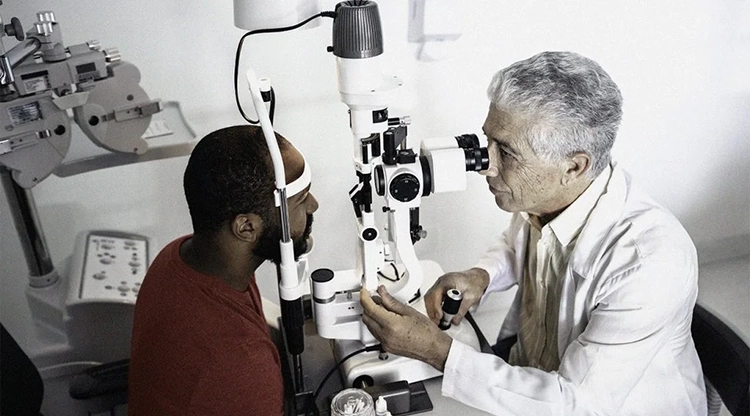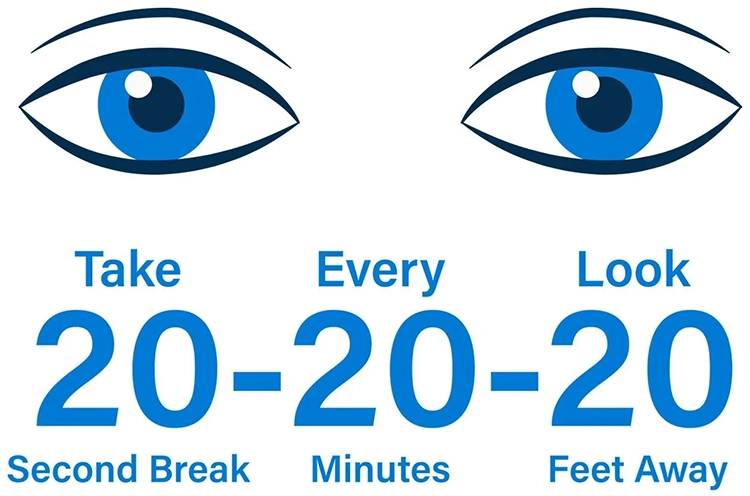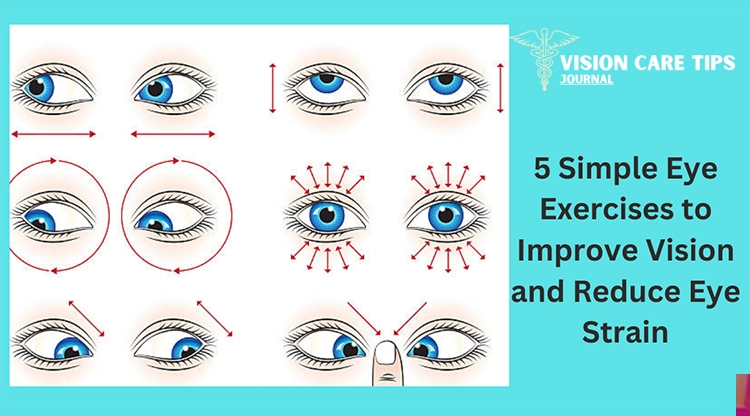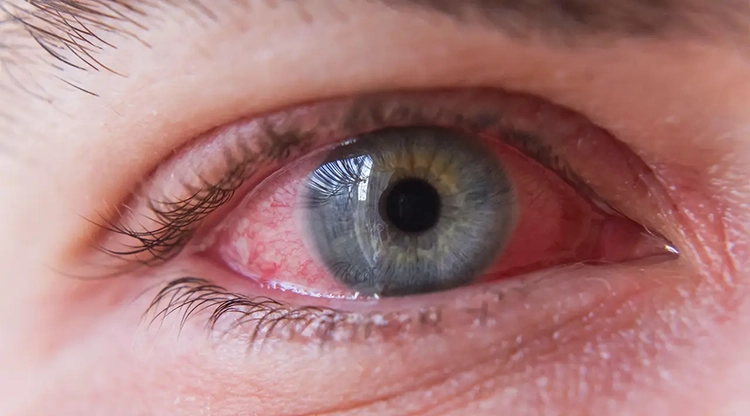



by Ralf Michael Urban, MD, PhD, Stanford School of Medicine

Maintaining good vision is crucial for overall well-being.
As an eye doctor, I see many patients every day who are struggling with eyesight problems.
Often, there is little I can do for them unless they are willing to make a few changes in their lifestyle.
That’s why I decided to write down some pro tips and hacks for improving your vision at home.
These tips are easy to implement and can make a significant difference in maintaining and enhancing your eye health.
Read carefully all of them. Some tips will definitely surprise you…

I recommend the 20-20-20 rule to all my patients who spend long hours in front of screens.
Every 20 minutes, take a 20-second break and look at something 20 feet away.
This simple practice helps relax your eye muscles and prevent digital eye strain. It’s a quick and effective method to give your eyes a much-needed rest throughout the day.
Vitamins and supplements play a crucial role in maintaining overall health, including eye health. Essential nutrients like vitamins A, C, and E, along with antioxidants, can significantly enhance visual clarity and reduce eye fatigue.
Adding a high-quality supplement to your daily regimen can provide these essential nutrients. Personally, I recommend many supplements to my patients.
According to their feedback, one of the best, and with no side effects, is SightCare. It contains a blend of vitamins and antioxidants that have proven effective in improving overall eye function and protecting against age-related vision decline.
Recently, I found out that many of my colleagues also know about SightCare, and they recommend it to their patients as well.

Good eye health starts with the food on your plate. Nutrients like omega-3 fatty acids, lutein, zinc, and vitamins C and E might help ward off age-related vision problems like macular degeneration and cataracts. To get them, fill your plate with:
A well-balanced diet also helps you stay at a healthy weight. That lowers your odds of obesity and related diseases like type 2 diabetes, which is the leading cause of blindness in adults.
Having the right eyewear is essential for those experiencing fluctuating vision.
Glasses that allow you to adjust your vision for different distances can save you from needing multiple pairs and provide convenience in various activities.
Such glasses, with their dual-lens technology, are an excellent choice for this purpose. They offer a practical solution for maintaining optimal vision without the hassle of switching pairs.
I usually don’t promote brands, but ViShift glasses are actually a good choice for anyone who doesn’t want to constantly change pairs and spend a fortune on them.
Proper lighting is essential to reduce eye strain.
Ensure your workspace is well-lit, using natural light where possible.
If natural light isn’t available, use soft white bulbs and position your light source to minimize glare on your screen or reading material.
Good lighting can help maintain eye comfort and prevent headaches.

If you use hazardous or airborne materials on the job or at home, wear safety glasses or protective goggles.
Sports like ice hockey, racquetball, and lacrosse can also cause eye injuries.
Wear eye protection. Helmets with protective face masks or sports goggles with polycarbonate lenses will shield your eyes.
Prolonged screen use can lead to eye strain and discomfort, especially for those with presbyopia or declining eye focus.
It’s important to use glasses that block blue light and reduce glare to enhance your reading and computer work experience.
There are plenty of glasses designed to do just that, offering durability and comfort. They are particularly beneficial for office workers and seniors, providing a clearer and more comfortable visual experience.
Personally, I have a pair of Hilipert Reading Glasses. They’re really inexpensive and do exactly what they promise. When reading my e-mails or writing a paper, Hilipert is my go-to pair of glasses.

Performing simple eye exercises can help maintain flexibility and strength in your eye muscles.
Try focusing on a distant object for a few seconds, then switch to a closer object.
Repeat this exercise several times to improve focus and reduce eye fatigue.
Regular eye exercises can contribute to better eye health and clearer vision.

A virus causes most cases of pink eye. These cases don’t respond to antibiotics. Viral conjunctivitis will disappear on its own. Have your ophthalmologist diagnose your particular case.
Reduce the discomfort of conjunctivitis by applying cool compresses to the eye.
If your conjunctivitis is bacterial, follow your treatment plan. This usually involves antibiotic eye drops. In either case, you should take steps to reduce the chance of passing the problem on to someone else. Conjunctivitis is highly contagious. Follow these tips to prevent the spread:
Driving at night can be challenging due to glare from oncoming headlights and poor visibility.
Several of my patients have recommended specifically designed glasses for night driving, claiming they significantly reduced glare and improved visibility.
Intrigued, I decided to try them myself. I found that these glasses effectively minimized the discomfort caused by oncoming headlights and enhanced overall clarity during nighttime driving.
Their yellow-tinted lenses filter out harsh lights, making night driving safer and more comfortable. The lightweight, durable design ensures they can be worn over prescription glasses if needed, providing a versatile solution for all drivers.
Plus, according to dozens of studies, yellow-tinted lenses improve vision at night by a staggering 37%!
If you don’t have any particular brand in mind, I would definitely recommend Hawk Eye Glasses. They’re cheap and can be worn easily over prescription glasses.
I’m so used to Hawk Eye that every time I drive without them, I notice that something’s really off!
Wearing sunglasses can protect your eyes from harmful UV rays, which can lead to cataracts and macular degeneration.
Choose sunglasses that block 99% to 100% of UVA and UVB rays.
Polarized lenses can also reduce glare, improving visual comfort during outdoor activities.
Investing in quality sunglasses is a simple way to safeguard your vision!

THIS IS AN ADVERTISEMENT AND NOT AN ACTUAL NEWS ARTICLE, BLOG, OR CONSUMER PROTECTION UPDATE
MARKETING DISCLOSURE: This website is a marketplace. As such, you should know that the owner has a monetary connection to the product and services advertised on the site. The owner receives payment whenever a qualified lead is referred, but that is the extent of it. Read more on our Advertising Disclosure. We are not responsible for product returns, product-related support, and product shipping. If you are not fully happy with the goods you have received, please contact the provider of the goods directly. You can find more information regarding the provider(s) of the product(s) via our Private Policy Statement or on our Contact page. By using our website, you understand and agree that you are solely responsible for making your own evaluations, decisions, and assessments about whether to engage with any service that is provided. All representations and warranties regarding the information presented on this page are disclaimed. The information, including pricing, which appears on this site, is subject to change at any time.
ADVERTISING DISCLOSURE: This website and the products & services referred to on the site are advertising marketplaces. This website is an advertisement and not a news publication. Any photographs of persons used on this site are models. All product names, logos, and brands are intellectual property of their respective owners. All company, product, and service names used on this website are for identification purposes only. The use of these names, logos, and brands does not imply endorsement. The owner of this site and of the products and services referred to on this site only provides a service that consumers can obtain and compare. Our website can contain hyperlinks. If you click this hyperlink, you will leave our website and go to another company’s website. At that point, our site does not have any influence on the services offered by the website in question or on the website’s methods. These websites have their own privacy policy that is completely separate from our privacy policy. Our privacy policy only refers to data processed by this site. Therefore, this site does not accept any responsibility or liability for services and/or websites by third parties or their methods and/or contents.
HEALTH DISCLAIMER: This website is not intended to provide medical advice or to take the place of medical advice and treatment from your personal physician. Visitors are advised to consult their own doctors or other qualified health professional regarding the treatment of medical conditions. The author shall not be held liable or responsible for any misunderstanding or misuse of the information contained on this site or for any loss, damage, or injury caused, or alleged to be caused, directly or indirectly by any treatment, action, or application of any food or food source discussed in this website. The U.S. Food and Drug Administration have not evaluated the statements on this website. The information is not intended to diagnose, treat, cure, or prevent any disease.